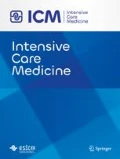A 56-year-old patient was admitted in our institution for an acute ischemic stroke due to the occlusion of the right middle cerebral artery. Angio-CT scan performed upon admission showed lesions suggestive of COVID-19, which was confirmed by specific SARS-CoV-2 polymerase chain reaction (PCR). The next day, the patient developed abdominal pain and vomiting. CT scan was performed. It demonstrated a free-floating thrombus of the aortic arch (Fig. 1, panel a) associated with an occlusion of the superior mesenteric artery (Fig. 1, panel b). There was no sign of aortic atherosclerosis. Absence of enhancement of part of the small bowel wall was also noted (Fig. 1, panel c). The patient underwent endovascular thrombectomy and a laparotomy with the resection of two meters of the small bowel.
a Oblique sagittal reformatted CT scan image showing the intraluminal filling defect of the aortic arch corresponding to the free-floating thrombus (black arrow). b Coronal CT scan image showing occlusion of the superior mesenteric artery and its branches a few centimeters from its origin (white arrow). c Coronal CT scan image showing dilatation and un-enhancement of the wall of part of the small bowel (white arrows)
COVID-19 may predispose to both venous and arterial thromboembolic diseases due to excessive inflammation, hypoxemia, immobilization and, in extreme cases, disseminated intravascular coagulation. Moreover, recent studies have shown that the virus targets endothelial cells which results in endothelial dysfunction.
Most publications have highlighted the frequency of venous thrombosis and pulmonary embolism complicating COVID-19. Multiple arterial thromboembolic complications are less common.
This case supports the hypercoagulability state in COVID-19 patients and reinforces the recommendation to apply pharmacological thrombosis prophylaxis.
Author information
Authors and Affiliations
Corresponding author
Ethics declarations
Conflicts of interest
Author's do not report any conflict of interest nor any financial interest.
Additional information
Publisher's Note
Springer Nature remains neutral with regard to jurisdictional claims in published maps and institutional affiliations.
Rights and permissions
About this article
Cite this article
Azouz, E., Yang, S., Monnier-Cholley, L. et al. Systemic arterial thrombosis and acute mesenteric ischemia in a patient with COVID-19. Intensive Care Med 46, 1464–1465 (2020). https://doi.org/10.1007/s00134-020-06079-2
Received:
Accepted:
Published:
Issue Date:
DOI: https://doi.org/10.1007/s00134-020-06079-2


